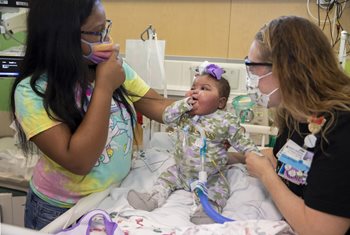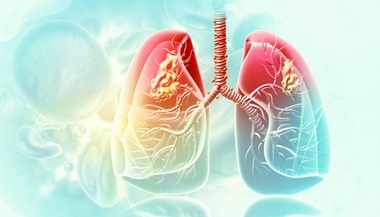Bronchopulmonary Dysplasia
What is bronchopulmonary dysplasia?
Bronchopulmonary dysplasia, or BPD, is a serious lung condition that affects mostly babies who are born more than 10 weeks before their due date, weigh less than two and a half pounds, have breathing problems at birth and need long-term breathing support and oxygen. Many of these babies are born with serious respiratory distress syndrome because their lungs haven't yet developed enough to make surfactant, a liquid that coats the inside of the lungs and keeps them open so that the baby can breathe in air once he or she is born. Doctors believe that a baby gets bronchopulmonary dysplasia as a result of the way his or her lungs respond to things in the outside environment during the first hours or days after birth, including high levels of oxygen given newborns with breathing problems, pressure caused by mechanical ventilation and infections.
Symptoms
Most babies who get bronchopulmonary dysplasia are born with respiratory distress syndrome, which results in:
- Rapid, shallow breathing
- Sharp pulling in of the chest below the ribs with each breath
- Grunting sounds during exhalation
- Flaring of the nostrils during breathing
Diagnosis
It's hard to tell whether a baby with breathing problems has bronchopulmonary dysplasia before he or she is about 14 to 30 days old. At this point, the baby should show improved breathing, but instead the baby's condition seems to be getting worse and he or she needs more oxygen. Blood tests, chest X-ray and echocardiogram help doctors diagnose breathing problems correctly. BPD is graded as mild, moderate or severe, depending on how much extra oxygen the baby needs and how long he or she needs it.
Treatment
These babies are usually put on oxygen and a breathing machine at birth — either a ventilator (also known as a respirator) or a nasal continuous positive airway pressure (NCPAP) machine. This can prevent damage to their brains and other body organs from lack of oxygen. They also are given surfactant and medicines, including bronchodilators to improve the flow of air in and out of the lungs, diuretics to help remove extra fluid from the lungs and antibiotics to control infections.
Prognosis
Most babies with RDS begin to get better within the next 2 to 4 weeks, but some get worse and need more oxygen and/or breathing assistance from a machine. Babies who develop BPD also are more likely than other infants to have problems in other parts of their bodies that aren't yet fully developed, including the heart, kidneys, brain, stomach, intestines and eyes. With new and better treatments now available, most babies with BPD get better over time and many go on to live normal, active lives.
Prevention
Seeing your doctor regularly during your pregnancy, eating right, avoiding tobacco smoke, alcohol and illegal drugs, and controlling any ongoing medical conditions can help prevent BPD.





